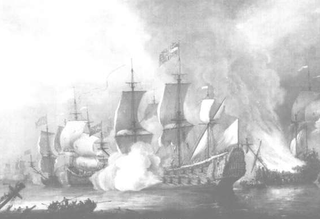 W
WThe Battle of Bantry Bay was a naval engagement fought on 11 May 1689, a week before the declaration of the Nine Years' War. The English fleet was commanded by Admiral Arthur Herbert, created Earl of Torrington after the Battle; the French fleet by François Louis de Rousselet, Marquis de Châteaurenault. Apart from the inshore operations at La Rochelle in 1627–28, the Battle of Bantry Bay was the first time English and French navies had met in fleet action since 1545.
 W
WThe Battle of Batočina was fought on 29–30 August 1689 near the town of Batočina in the Sanjak of Smederevo, between Holy Roman and Ottoman forces during the Great Turkish War (1683–99).
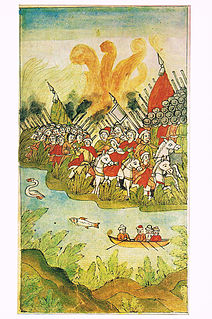 W
WThe Crimean campaigns of 1687 and 1689 were two military campaigns of the Tsardom of Russia against the Crimean Khanate. They were a part of the Russo-Turkish War (1686–1700) and Russo-Crimean Wars. These were the first Russian forces to come close to Crimea since 1569. They failed due to poor planning and the practical problem of moving such a large force across the steppe but nonetheless played a key role in halting the Ottoman expansion in Europe. The campaigns came as a surprise for the Ottoman leadership, spoiled its plans to invade Poland and Hungary and forced it to move significant forces from Europe to the east, which greatly helped the League in its struggle against the Ottomans.
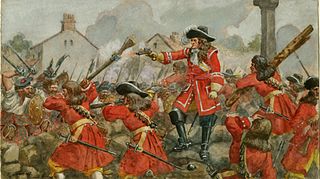 W
WThe Battle of Dunkeld was fought between Jacobite clans supporting the deposed king James VII of Scotland and a regiment of covenanters supporting William of Orange, King of Scotland, in the streets around Dunkeld Cathedral, Dunkeld, Scotland, on 21 August 1689 and formed part of the Jacobite rising of 1689, commonly called Dundee's rising in Scotland. The battlefield was added to the Inventory of Historic Battlefields in Scotland in 2012.
 W
WThe Jacobite rising of 1689 was a revolt seeking to restore James II & VII, following his deposition in November 1688. Adherents of the exiled House of Stuart were known as 'Jacobites', from Jacobus, Latin for James, and the associated political movement as Jacobitism.
 W
WThe Battle of Killiecrankie, also referred to as the Battle of Rinrory, took place on 27 July 1689 during the 1689 Scottish Jacobite rising. A Jacobite force under John Graham, Viscount Dundee defeated a government army commanded by Hugh Mackay.
 W
WThe Lachine massacre, part of the Beaver Wars, occurred when 1,500 Mohawk warriors launched a surprise attack against the small settlement of Lachine, New France, at the upper end of Montreal Island on the morning of August 5, 1689. The attack was precipitated by growing Iroquois frustration with the increased French incursions into their territory, ongoing concern about French Marquis de Denonville's attack of 1687, and was encouraged by the settlers of New England as a way to leverage power against New France during King William's War.
 W
WLeisler's Rebellion was an uprising in late-17th century colonial New York in which German American merchant and militia captain Jacob Leisler seized control of the southern portion of the colony and ruled it from 1689 to 1691. The uprising took place in the aftermath of England's Glorious Revolution and the 1689 Boston revolt in the Dominion of New England, which had included New York. The rebellion reflected colonial resentment against the policies of deposed King James II.
 W
WThe Battle of Loup Hill took place near Loup Hill in Kintyre on 16 May 1689, during the Jacobite rising of 1689, a connected conflict of the Williamite War in Ireland.
 W
WThe Battle of Niš was fought on 24 September 1689, near the city of Niš in southern Serbia, between the forces of the Ottoman Empire, and the forces of the Holy Roman Empire as part of the Great Turkish War.
 W
WThe Siege of Pemaquid was a successful attack by a large band of Abenaki Indians on the English fort at Pemaquid, Fort Charles, then the easternmost outpost of colonial Massachusetts. The French-Abenaki attack was led by Jean-Vincent d'Abbadie de Saint-Castin and Father Louis-Pierre Thury and Chief Moxus. The fall of Pemaquid was a significant setback to the English. It pushed the frontier back to Casco (Falmouth), Maine.
 W
WThe Protestant Revolution of 1689, sometimes called Coode's Rebellion after one of its leaders, John Coode, took place in the Province of Maryland when Puritans, by then a substantial majority in the colony, revolted against the proprietary government led by the Roman Catholic Charles Calvert, 3rd Baron Baltimore.
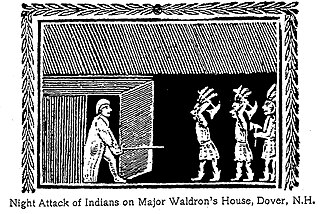 W
WThe Raid on Dover happened in Dover, New Hampshire on June 27–28, 1689. Led by Chief Kancamagus, it began King William's War, a series of Indian massacres orchestrated by Jean-Vincent d'Abbadie de Saint-Castin and Father Louis-Pierre Thury.
 W
WThe Siamese revolution of 1688 was a major popular upheaval in the Siamese Ayutthaya Kingdom which led to the overthrow of the pro-French Siamese king Narai. The Mandarin Phetracha, previously one of Narai's trusted military advisors, took advantage of the elderly Narai's illness, and killed Narai's Christian heir, along with a number of missionaries and Narai's influential foreign minister the Greek adventurer Constantine Phaulkon. Phetracha then married Narai's daughter, took the throne, and pursued a policy of ousting French influence and military forces from Siam. One of the most prominent battles was 1688's Siege of Bangkok, when tens of thousands of Siamese forces spent four months besieging a French fortress within the city. As a consequence of the revolution, Siam severed significant ties with the West, with the exception of the Dutch East India Company, until the 19th century.
 W
WThe Siege of Bonn took place in 1689 during the Nine Years' War when the forces of Brandenburg-Prussia and the Dutch Republic besieged and captured Bonn. It was part of the Rhineland campaign which Brandenburg was fighting as part of the Grand Alliance against Louis XIV of France. Following Louis' incursions into the Rhineland the previous year, a coalition of nations had formed to resist French hegemony.
 W
WThe Siege of Carrickfergus took place in August 1689 when a force of Williamite troops under Marshal Schomberg landed and laid siege to the Jacobite garrison of Carrickfergus in Ireland. After a week the Jacobites surrendered, and were allowed to march out with the honours of war.
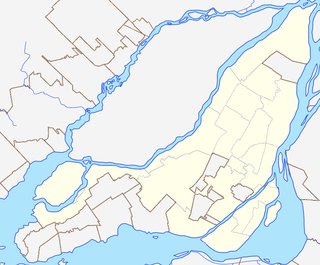 W
WThe Battle of the Lake of Two Mountains was a battle of the Beaver Wars between the colony of New France and the Iroquois Confederacy that occurred on October 16, 1689.
 W
WThe Battle of Walcourt was fought on 25 August 1689 during the Nine Years' War. The action took place near the ancient walled town of Walcourt near Charleroi in the Spanish Netherlands, and brought to a close a summer of uneventful marching, manoeuvring, and foraging. The battle was a success for the Grand Alliance – the only significant engagement in the theatre during the campaign of 1689.